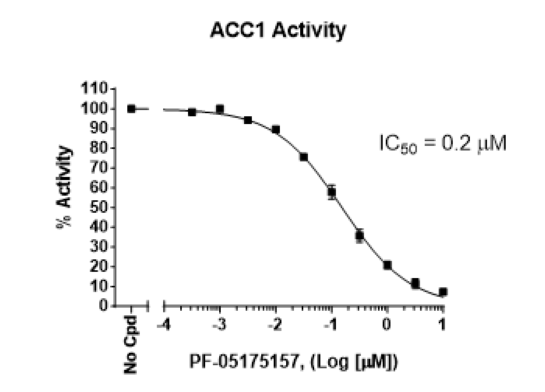ACC1 Assay Service
●
Target
ACC1
●
Description
Screening and/or profiling inhibitor compounds against ACC1 carboxylase activity in a biochemical assay.
●
Synonyms
acetyl-Coenzyme A carboxylase alpha transcript variant 1, ACC-1, ACC 1, ACC -1, acetyl-coa carboxylase, acetyl coa , acetyl coenzyme a
●
Example Data

*Example only, final data may vary.
Assay Details
●
Assay Format
Luminescent
●
Reference Compounds and IC50
PF-05175157, 0.2 μM
●
Assay Principle
The Acetyl-Coenzyme A Carboxylase 1 (Human ACC1) assay is designed to measure ACC1 activity for screening and profiling applications using ADP-Glo™ reagents as a detection reagent.
Target Details
●
Protein Family
Metabolic Enzyme
●
UniProt
Q13085
●
Background
ACC1 (acetyl-coenzyme A carboxylase 1) is one of two isoforms of acetyl-CoA carboxylase. It is a cytosolic and it is involved in ATP-dependent carboxylation of acetyl-CoA to malonyl-CoA, the rate-limiting step in de novo fatty acid synthesis, and it is found predominantly in the liver and adipose tissue. Its function is regulated by phosphorylation, allosteric regulators and other proteins, in response to the energetic needs of cells. Acetyl-CoA is at the crossroads between multiple metabolic pathways, so ACC1 has an impact in the formation of building blocks for new cells and in the response to metabolic stress. ACC1 has been linked to several diseases, such as cancer, diabetes, NAFLD (non-alcholic fatty liver disease) and obesity. Inhibition of ACC1 by TOFA (5-tetradecyloxy-2-furoic acid) can result in complete blockage of DNL (de novo lipogenesis) and may be a potential therapy for patients with NAFLD. The development of inhibitors specific for ACC1, for instance by targeting their catalytic domains or dimerization, may prove beneficial in the treatment of ACC1-related diseases.
Delivery
●
Estimated Turnaround
Two to three weeks following delivery of compounds
●
Results
Extensive report with raw and analyzed data, graphs, and detailed protocols. Includes positive control for inhibition.

